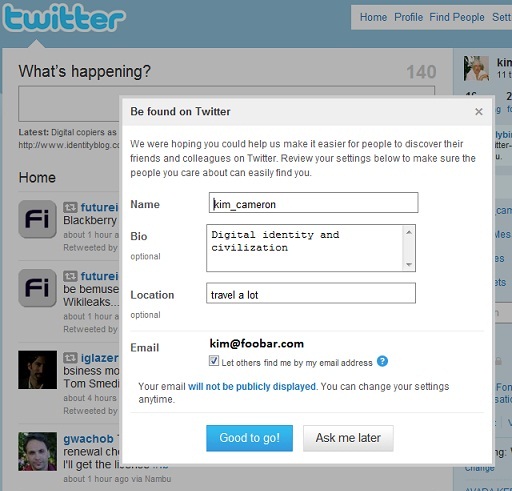I had a tiny and unobtrusive little “privacy experience” today with Twitter that gives the lie to the idea that privacy makes things complicated and unruly.
Someone had tried to locate me using my email address. My privacy settings did not allow this (not sure if it was because Twitter's privacy policy had changed or because of my initial choices). No matter, Twitter sent me a one-sentence email that explained the situation, and when I clicked on the link allowed me to change my options with a single button press. End of story.
The whole process was low friction and – being tied to someone's attempt to get in touch with me – had a “pay-as-you-go” appeal. This wasn't some indigestible abstract policy – and I wasn't being misled by burying information on page 37 of a legal statement. The whole UI experience made it clear that policy settings can be tied into their context in a way that is helpful and unobtrusive.


I'm only minimally familiar with Twitter, but I sure wish Facebook would adopt a philosophy like this. Right now it is littered with too many policies that are too difficult to understand and apply out of context. It would be much better if I could say “lock it all down then prompt me when you think I should consider opening something up”, and have the experience be like the one you show for Twitter.
+1. Out of context, things get so complicated so fast. What I liked about the Twitter experience was that I understood exactly what my “exposure” was in letting those who know my email address contact me.. That's a pretty well defined decision… And the clarity was satisfying… On Facebook I never have a clue as to what I'm REALLY enabling.
Of course it seems Facebook has been dragged heels-in-the-ground to “socially acceptable” privacy policies, and its user experience around privacy has somehow seemed an “I-told-you-so” proof that “privacy hurts”. Big complex policies are a natural input to (outcome of?) that proof.
Twitter has been a lot hipper in figuring out which way the wind blows. The result in this case is real innovation. Let's hope the idea spreads.
Meanwhile Danah Boyd has done interesting research on the response of young users to Facebook privacy alternatives. I'll put up the reference.